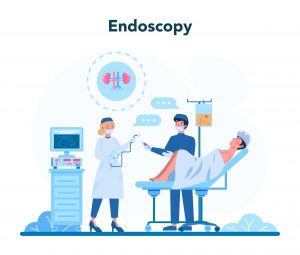Has your GP recently referred you for an Endoscopy and you are unsure what it is? It may seem like a scary prospect as you won’t know exactly what to expect, but this article will help to explain what an endoscopy involves and leave you feeling more comfortable about your upcoming procedure.
What is an Endoscopy?
During an endoscopy, a doctor, usually known as a Gastroenterologist will insert a specialist instrument called an endoscope into either the mouth or rectum. This is a thin flexible tube with a camera attached to allow your doctor to see either the upper or lower gastrointestinal tract (known commonly as upper GI or lower GI). An upper GI endoscopy is referred to as a Gastroscopy, and a lower GI endoscopy is referred to as a Colonoscopy. Should a surgical intervention be needed, your doctor can use forceps or scissors on the endoscope to operate or remove any tissue for biopsy.
Why do I need an Endoscopy?
An endoscopy is useful for diagnosing and treating gastrointestinal illnesses, as well as monitoring chronic disorders. It allows doctors to view these conditions without making any large incisions. They are typically used to check changes in bowel habits or abnormal symptoms that could be causing such problems. These include:
- Constipation
- Diarrhoea
- Blood in your stools
- Bloating and excess wind
- Nausea and vomiting
- Heartburn
- Abdominal pain
- Difficulty swallowing
- Unexplained weight loss
They may also refer you for an endoscopy if you are having symptoms of any of the following conditions:
- Gallstones

- Stomach ulcer
- Inflammatory bowel disease (IBD)
- Crohn’s disease
- Ulcerative colitis
- Pancreatitis
- Blockage of the oesophagus
- Infections
- Hiatal hernia
- Gastroesophageal reflux disease (GERD)
- Other digestive tract issues
How do I prepare for an Endoscopy?
Your doctor will discuss the procedure with you beforehand, and will ask questions relating to your medical history, reasons for having the procedure and any special instructions for you to follow before your appointment. You should inform your doctor of any medications you are taking, including supplements and over the counter drugs. You may be required to stop taking them if they affect bleeding. Ensure you read everything and ask any questions if there is anything you are uncertain of.
Most types of endoscopy will require you to stop eating solid foods for up to 12 hours before the procedure. Clear liquids such as water or juice may be allowed for up to 2 hours before, but you should check with your doctor.
If you are having a colonoscopy, a mild laxative or enema may be recommended the night before your procedure to clear your system.
What happens during the Endoscopy?
An endoscopy is not painful, and it is unlikely that you will be given a general anaesthetic. However, you may be given a local anaesthetic or sedation to reduce discomfort. This will make you feel relaxed and sleepy. Patients are usually unaware of what is going on and do not remember anything when they wake up.
During a gastroscopy, you will lie down on your side with your head popped up. A tube will then be passed through a mouth guard to ensure there is no damage to your teeth, and then down your throat.
During a colonoscopy, you will again lie on your side and the endoscope is inserted into your anus to explore the inside of the colon (the large bowel).
The procedure typically lasts no longer than 45 minutes, depending on what the doctor is investigating. Once complete, the tube will be removed and you will be woken up from the sedation.

 One Ashford
One Ashford One Hatfield
One Hatfield